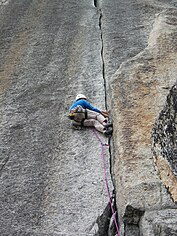In rock climbing, a crack climb is a type of climbing route that follows a system of crack(s) or fissure(s) that the climber uses to ascend the route. The width of the crack dictates the techniques needed, and crack-climbs are further differentiated by the body parts that can be 'jammed' into them, such as finger cracks (the narrowest), hand/fist cracks, arm cracks, and body (also called chimney) cracks. Off-width cracks are some of the most awkward, being too wide for the hands or arms, but too narrow to accommodate the body. The rare top-to-bottom uniform-width crack is called a splitter crack.[1][2]
Crack climbing routes require a broad range of techniques, but most importantly emphasize the techniques of 'laybacking' and of 'jamming'. Laybacking requires the crack to be off-set (i.e. one side protrudes) or in a corner, to create the opposing forces needed for the technique.[1] 'Jamming' is where the climber physically "jams" a body-part into the crack which they then pull on to gain upward momentum.[1] The type of rock has an important effect on the effectiveness of 'jamming', with the high-friction surface of granite being particularly suited to the technique.[1] The friction needed for 'jamming' can wear the climber's skin, requiring medical tape or specialist gloves for long crack routes.[3][4]
Crack climbs are particularly suited to traditional climbing as the crack can accomodate the protection (e.g. Separate Reality).[2] The invention of spring-loaded camming devices in the 1970s revolutionised the difficulty of cracks that could be attempted by traditional climbers,Cite error: A <ref> tag is missing the closing </ref> (see the help page).[5] While the advent of bolted sport climbing routes in the 1980s diverted focus to the blanker face climbs, crack-climbs contined to feature prominently in the development of multi-pitch and big wall climbs, and most notably on the giant granite cracks on El Capitan and its famous routes such as The Nose.[6]
The the early 2000s saw a resurgence in traditional climbing, placing crack-climbing back in focus. Swiss climber Didier Berthod 'greenpointed' the bolted crack line of Greenspit at 8b+ (5.14a),[7][8] as did Canadian Sonnie Trotter on The Path,[9] and Austrian Beat Kammerlander on Prinzip Hoffnung.[10] In 2006, new traditional-grade milestones were set on crack-climbs by Trotter on Cobra Crack at 8c (5.14b),[9] and by Scottish climber Dave MacLeod on Rhapsody at 8c+ (5.14c).[9] In 2008, American climber Beth Rodden freed the Yosemite crack-line of Meltdown at 8c+ (5.14c), becoming the first-ever women to climb a traditional route at that grade, which at the time was also the highest traditional grade climbed anywhere.[11] In 2011, British crack specialists, Pete Whittaker and Tom Randall, climbed the world's hardest off-width crack, Century Crack at 8b (5.13d).[12][13] In 2021, the same duo, climbed the world's longest roof climb, a 762-metre (2,500 ft) cement crack under the M5 motorway in Devon, called The Great Rift at 5.13 (7c+).[14][15]
See also
editReferences
edit- ^ a b c d Long, John; Gaines, Bob (August 2022). "Chapter 5. Crack Climbing". How to Rock Climb (6th ed.). Falcon Guides. pp. 85–121. ISBN 978-1493056262.
- ^ a b Whittaker, Pete (January 2020). Crack Climbing. Vertebrate Publishing. ISBN 978-1493056262.
- ^ Whittaker, Pete (12 October 2021). "Pete Whittaker's Five Ultimate Rules for Crack Climbing". Climbing. Retrieved 8 October 2024.
- ^ Pease, Ken (5 August 2022). "How to Crack Climb". Climbing. Retrieved 8 October 2024.
- ^ Oviglia, Maurizio (23 December 2012). "The evolution of free climbing". PlanetMountain.com. Retrieved 9 October 2024.
- ^ Bisharat, Andrew (6 October 2009). "Chapter 1: Ethics, Style, and Emergence of Sport Climbing". Sport Climbing: From Toprope to Redpoint, Techniques for Climbing Success. Mountaineers Books. ISBN 978-1594852701. Retrieved 8 October 2024.
- ^ "Watch Didier Berthod is Back / Interview with Swiss crack climbing legend". PlanetMountain. 19 May 2021. Retrieved 9 October 2024.
- ^ "Greenspit, the dream of a generation climbed in Valle Orco by Matteo della Bordella, Francesco Deiana". PlanetMountain. May 2019. Retrieved 9 October 2024.
- ^ a b c Lambert, Erik (31 August 2007). "Trotter Chops Bolts, Sends Marathon Crack Project". Alpinist. Retrieved 8 February 2023.
- ^ "Prinzip Hoffnung, from Beat Kammerlander madness to new crack climbing classic" [es]. Desnivel (in Spanish). 10 March 2014. Retrieved 9 October 2024.
- ^ "Jacopo Larcher repeats Beth Rodden's Meltdown in Yosemite". PlanetMountain. 26 November 2022. Retrieved 8 October 2024.
- ^ Pardy, Aaron (6 November 2023). "Rare Repeat of World's Hardest Offwidth Crack". Gripped Magazine (Canada). Retrieved 8 October 2024.
- ^ The Editors (11 November 2011). "Wide Boyz on Century Crack (5.14b), World's Hardest Offwidth". Climbing. Retrieved 8 October 2024.
- ^ "Longest Roof Climb". Guinness World Records. 2024. Retrieved 8 October 2024.
The longest continuous roof (horizontal) climb in the world is "The Great Rift", a 762-m-long crack-climb that has been graded as a 5.13. The route, which runs along the underside of an elevated section of the M5 motorway in Devon, was discovered and completed for the first time in November 2021 by British climbers Tom Randall and Pete Whittaker
- ^ Clarke, Owen (8 December 2021). "Wide Boyz Tackle The Great Rift (5.13) Roof Crack Under 2,500-foot Cement Bridge". Climbing. Retrieved 8 October 2024.
Further reading
edit- Long, John; Gaines, Bob (August 2022). How to Rock Climb (6th ed.). Falcon Guides. ISBN 978-1493056262.
- Whittaker, Pete (January 2020). Crack Climbing. Vertebrate Publishing. ISBN 978-1493056262.
- The Mountaineers (2018). Mountaineering: The Freedom of the Hills (9th ed.). Quiller Publishing. ISBN 978-1846892622.
- Donahue, Topher (December 2016). Advanced Rock Climbing: Expert Skills and Techniques. The Mountaineers. ISBN 978-1-59485-862-8.
External links
edit- Getting Started Crack Climbing, REI (2024)
- Crack Climbing Technique, VDiff Climbing (2024)



